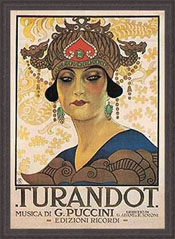First Performance: 25 April 1926, Teatro alla Scala,
Milan.
| Principal Characters: |
|
|
|
| Princess Turandot |
Soprano |
| The Emperor Altoum, her father |
Tenor |
| Timur, the dispossessed King of Tartary |
Bass |
| Calaf, the son of Timur |
Tenor |
| Liù, a young slave-girl |
Soprano |
| Ping, Grand Chancellor |
Baritone |
| Pang, General Purveyor |
Tenor |
| Pong, Chief Cook |
Tenor |
| A Mandarin |
Baritone |
| The Prince of Persia |
Silent role |
| The Executioner (Pu-Tin-Pao) |
Silent role |
Setting: Peking in the distant past.
Synopsis:
A Mandarin announces that any prince seeking to marry the Princess
Turandot must first answer three riddles. If he fails, he must die. The
latest suitor, the Prince of Persia, is to be executed at the moon's rising.
In the crowd is Timur, banished King of Tartary, who is reunited with his
son, Calaf, who he thought died in a battle. The Prince of Persia passes on
his way to the scaffold and the crowd calls upon the Princess to spare him.
Turandot bids that the execution proceed. As the death cry is heard, Calaf,
transfixed by the beauty of the Princess, strides towards the gong that
announces a new suitor. Turandot's ministers, Ping, Pang and Pong, try to
discourage Calaf. Timur and Liù (who is in love with Calaf) also beg him to
reconsider, but he strikes the gong and calls Turandot's name.
Ping, Pang and Pong lament Turandot's bloody reign, hoping that love will
conquer her icy heart and peace will return. They think longingly of their
distant country homes, but the noise of the populace gathering to hear
Turandot question the new challenger brings them back to reality.
The people, eager for another execution, have gathered in the square. The
Emperor asks Calaf to reconsider, but he refuses. Turandot describes how her
ancestor was dishonoured and killed by a conquering prince; the cruel trial
her suitors have to undergo is revenge for that crime. Turandot asks Calaf
three riddles, which he answers correctly. Turandot begs her father not to
give her to the stranger, but to no avail. Calaf, hoping to win her love,
offers Turandot a challenge: if she can learn his name by dawn, he will
forfeit his life.
Calaf hears a proclamation: on pain of death, no one in Peking shall sleep
until Turandot learns the stranger's name. Ping, Pang and Pong try
unsuccessfully to bribe him to learn his secret. As the mob threatens him,
soldiers drag in Liù and Timur. Calaf tries to convince the mob that neither
knows his secret. Liù declares that she alone knows but will never tell. She
is tortured, but remains silent. Impressed by such endurance, Turandot asks
Liù's secret: "Love" replies Liù. Fearing that she will weaken under torture
Liù seizes a dagger and kills herself. The crowd, fearful of her dead spirit,
forms a funeral procession. Left alone with Turandot, Calaf first reproaches
her for her coldness and cruelty, then kisses her. Feeling emotion for the
first time, Turandot weeps. Now sure of his victory, Calaf reveals his
identity. Before the assembled crowd, Turandot announces the stranger's name:
it is Love. As Calaf embraces her, the court hails the power of love and
life.
[Synopsis
Source: Opera Australia]
Click
here for the complete libretto.
Click
here for the complete libretto (German translation).
Click
here for the complete libretto (English translation).
Click here for the
complete text of Turandot, Prinzessin von China.
